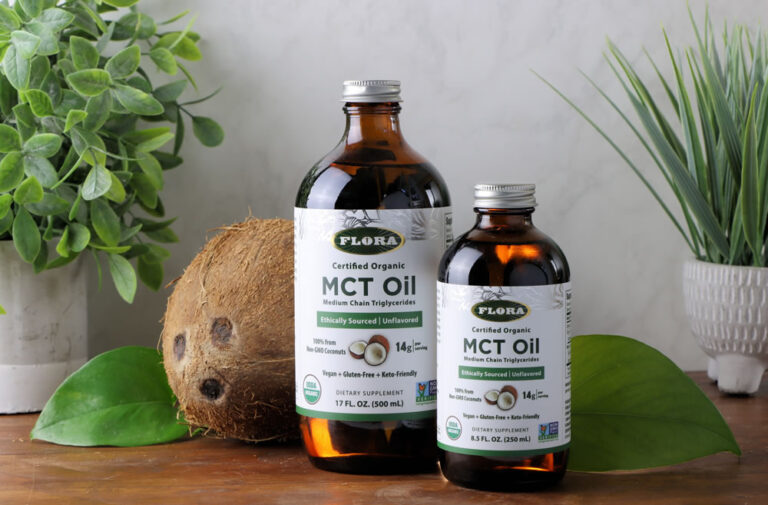The last few years has seen a rise in incredible weight loss stories, with the before and after pics to prove it all over social media. And the credit has been going to one diet in particular: the ketogenic diet.
A high-fat, low-carb diet that was developed back in the 1920’s as a way to treat epilepsy, the purpose of the keto diet is to get your body to get into a state of ketosis and turn it into a fat burning machine. [1]
Normally our bodies run on glycogen, an energy source made from carbs we get from foods like fruits, breads, and grains. But when we eat super low carbs on the keto diet our body doesn’t have enough sugars to run on. It then shifts to using a different source of energy called ketones which are made in the liver from the breakdown of body fat. This is known as “being in ketosis” and is the reason behind the fat burning and weight loss on the keto diet.
If you’re thinking of “going keto,” MCT oil, a beneficial keto-friendly supplement made from coconut oil (but different), is one of the healthiest and most beneficial sources of fats that can help you along the way.
MCTs, which stand for ‘medium-chain triglycerides’, although beneficial, are rare to find naturally in high amounts in food alone, which is why a supplemental form can be a big help.
But what the heck is MCT oil used for on the ketogenic diet? And what is it really good for?
Here we’ll break down what MCT oil is and what its potential benefits are so you can decide whether MCT oil might be a good fit for you on your keto journey.
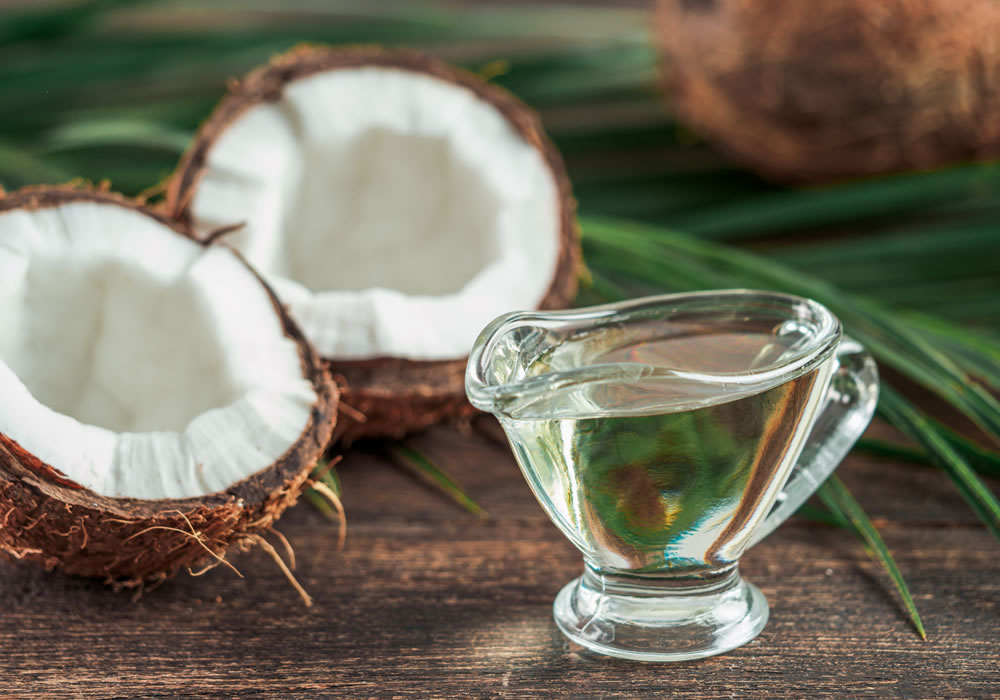
What are MCTs and What is MCT Oil?
To understand what MCT oil is and why it’s beneficial, we have to break down a little basic science behind the fats our body uses.
The building blocks of fats, called fatty acids, are generally classified by how many carbon molecules they’re made of.
They are:
Long Chain (12-18 carbon atoms) : Most of the fats in our diet are long chain fatty acids (LCTs). Our digestive system needs bile and pancreatic juices to break these down so they can be used for energy.
Short Chain (0-6 carbon atoms) : Most short chain fatty acids are made by the fermentation of fiber by the friendly bacteria in our colon. These are mainly used to feed the gut wall lining.
Medium Chain (7-12 carbon atoms):
Medium chain fatty acids, or MCTs, can be found in small amounts in dairy foods like butter, milk, full-fat yogurt and palm oil as well. Coconut oil is the richest source of MCTs with a concentration of about 60%. With a special process they can be separated from whole coconut oil, which leaves us with MCT oil.
Here are some benefits of MCTs on a keto diet:
- They’re easily used for energy by cells. Because of their special chemical structure MCTs don’t need to be digested the same way long chain fatty acids do.
- MCTs are quickly absorbed and then sent straight to the liver to be immediately used for energy by the body.
- MCTs are a great way to get a quick energy boost while on the keto diet.
And unlike LCTs, MCTs are stored as ketones in our body instead of body fat.
What’s in MCT Oil?
There are 4 types of MCTs. The less carbon atoms, the easier it is digested by the body.
- caproic acid (C6: 6 carbon atoms)
- caprylic acid (C8: 8 carbon atoms)
- capric acid (C10: 10 carbon atoms)
- lauric acid (C12: 12 carbon atoms)
Pure MCT oil is particularly rich in these two types of chain fatty acids including:
- Caprylic acid (C8) : Known as the most ketogenic form of MCT, it can provide an array of health benefits. Studies have revealed that it can be converted to ketones faster than other MCTs, with C10 coming in second. [2]
- Capric acid (C10): Capric acid, is built of 10 carbon molecules. Quickly metabolized into ketones, it’s a great source of energy for endurance and increased mental performance.
Are MCT Oil and Coconut Oil the Same?
No. MCT oil is made from coconut oil and is purely medium chain triglycerides (C8, C10 and sometimes C12). Coconut oil contains both MCTs and LCTs.
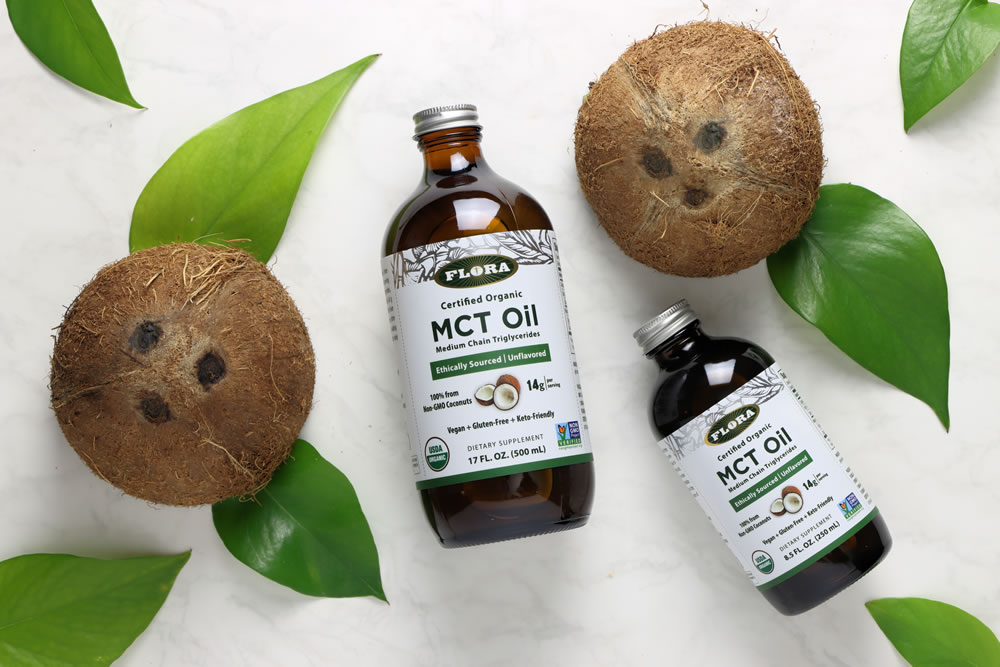
What Are Other Benefits of MCT Oil?
We’ve already learned that the unique structure of MCT oil provides the body with a quick and clean source of energy that’s easily absorbed by cells and less likely to be stored as body fat than the LCTs. [3] It also can also provide a great source energy, while keeping you in a fasted state.
MCT oil has been praised for having other benefits for the body and mind, some of which are supported by science.
Other potential benefits of MCT Oil include:
- MCT Oil May Support Weight Loss
Since MCT oil has about 10% less calories than long chain fatty acids, adding these to your diet can help with fat loss and reduce body weight in the long term. [4] [5] While more research needs to be done, one 2008 study found that subjects who consumed MCT oil as part of their weight-loss diet lost an average of 3.74 lbs (1.7 kg) more than those in the group assigned olive oil. [6]
- MCT Oil May Help Reduce Appetite
A few studies found that adding MCT Oil to your diet can make you eat less by encouraging the release of hormones that make you feel full. [7] One study of overweight men found that those who consumed MCT oil ate less. [8] Another study of normal weight men who were given an MCT-containing breakfast, were able to stay fuller longer until lunch and also ate less at lunch. [9]
- MCT Oil Can Help Boost Energy
MCT oil stimulates our bodies to burn fat faster for energy, but many keto dieters and fitness pros like to take MCT oil before workouts to help boost their endurance and increase performance while encouraging more fat burn. While results from studies about exercise performance have been mixed, MCT oil may also help by reducing the buildup of lactic acid in the muscles. An older study found that MCT oil may not only help you use more fat instead of carbs for energy, but cyclists who took 1.5 teaspoons of MCTs with food before cycling had lower lactate levels (the acids in muscles that can cause soreness) and found exercising easier than those taking LCTs [10].
- It Can Help You Stay In Ketosis and Provide Similar Benefits to those Not on a Keto Diet
Besides fasting and eating low-carb, another way to get into ketosis is through supplements called exogenous ketones. MCT oil is one type of exogenous ketone and it can help raise blood ketones even if you aren’t following a high-fat keto diet or fasting. Taking MCT oil can make it easier for the body to stay in ketosis, so it can continue to burn stored body fat and you can lose more weight.
- MCT Oil Is Antimicrobial and May be Good for the Gut
MCTs have been well-studied and documented for their antifungal and antimicrobial properties. [11, 12, 13]. Evidence shows that MCTs may also have a positive effect on gut health by stimulating good bacteria while reducing the growth of certain bad bacteria. [14 ] [15]
- MCTs May Help Fuel The Brain and Boost Cognitive Function
Your brain can’t use fat as energy the way other organs do, and when glucose isn’t readily available, ketones happen to be its preferred source of energy. [16] It’s not a surprise that many keto dieters report feeling more clear headed with better focus after fueling up on MCTs throughout the day. MCTs boost ketone production in the body, which easily pass through the blood-brain barrier giving your brain the fuel it needs. It’s no surprise that many report better focus and mental performance after taking MCT oil. One promising study showed adults following a keto diet for 6–12 weeks with a risk of Alzheimer’s disease showed improvement in memory. [17] Try MCT oil to give your brain the energy boost it needs.
- MCT Oil May Be Good For Heart Health
MCT oil can be a good tool to help you lose weight on the keto diet, which can help lower cholesterol levels over time and improve cardiovascular health. Weight loss alone may reduce the risk for heart attack, but some studies have pointed to evidence that MCT oil could potentially boost our good HDL cholesterol while reducing inflammatory proteins called C-reactive proteins (CRP) which have been connected with an increased risk for heart disease. [18, 19]
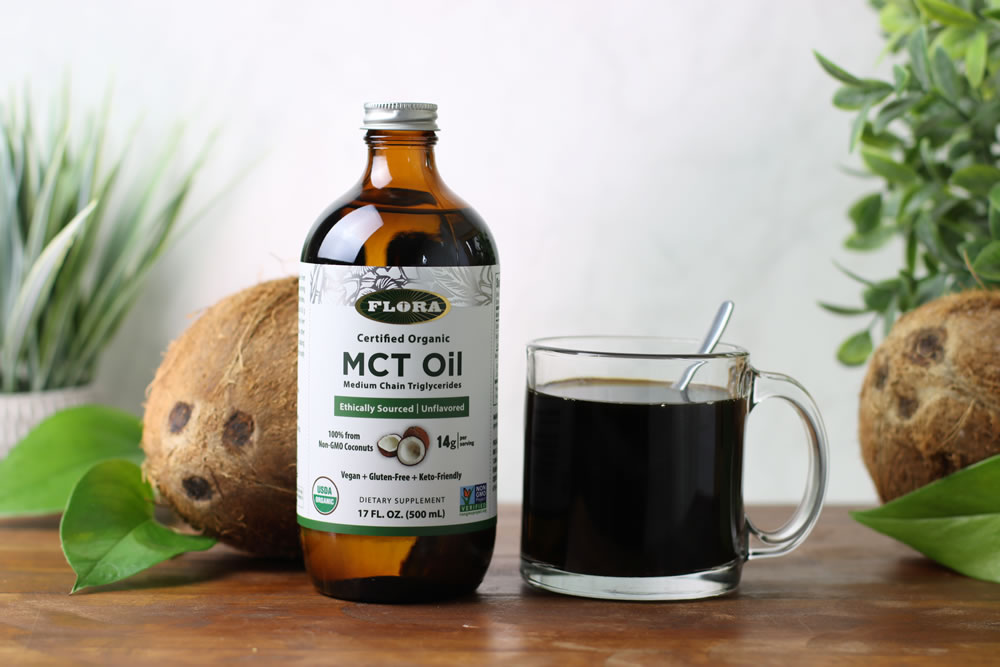
What are the Best Ways to Use MCT Oil?
Since MCT oil is a colorless and neutral tasting oil without any flavor, you can use it in a variety of ways without changing the taste or look of your food.
One thing to be aware of is that since MCT oil has a lower smoke point of 325 degrees, it shouldn’t be used for high heat cooking like frying or roasting. To preserve its beneficial qualities, it’s best to simply add MCT oil to foods you’ve already cooked or use it in low heat dishes.
For those on the ketogenic diet, the most popular way to use MCT oil is stirred into your morning coffee for a fat-burning boost of energy to fuel your brain and body to start your day.
To use MCT oil:
- Take before lunch and breakfast for a boost of energy and to encourage your body to burn fat through the day.
- Take MCT oil before intermittent fasting to supply your body with healthy ketone boosting fats and to suppress your appetite.
For other ways to use MCT Oil, add it to:
- Smoothies and protein shakes
- Salad dressings and as a base for homemade mayo
- Stir into yogurt or breakfast dishes
- Drizzled over veggies
- Stirred into soups and dips
- Keto fat bomb recipes
Most of us don’t consume high amounts of MCTs in our normal diet, so it can take our digestive systems a minute to get used to pure MCT oil. With MCT oil, it’s best to start slowly and increase gradually. Start with a teaspoon and work your way up.
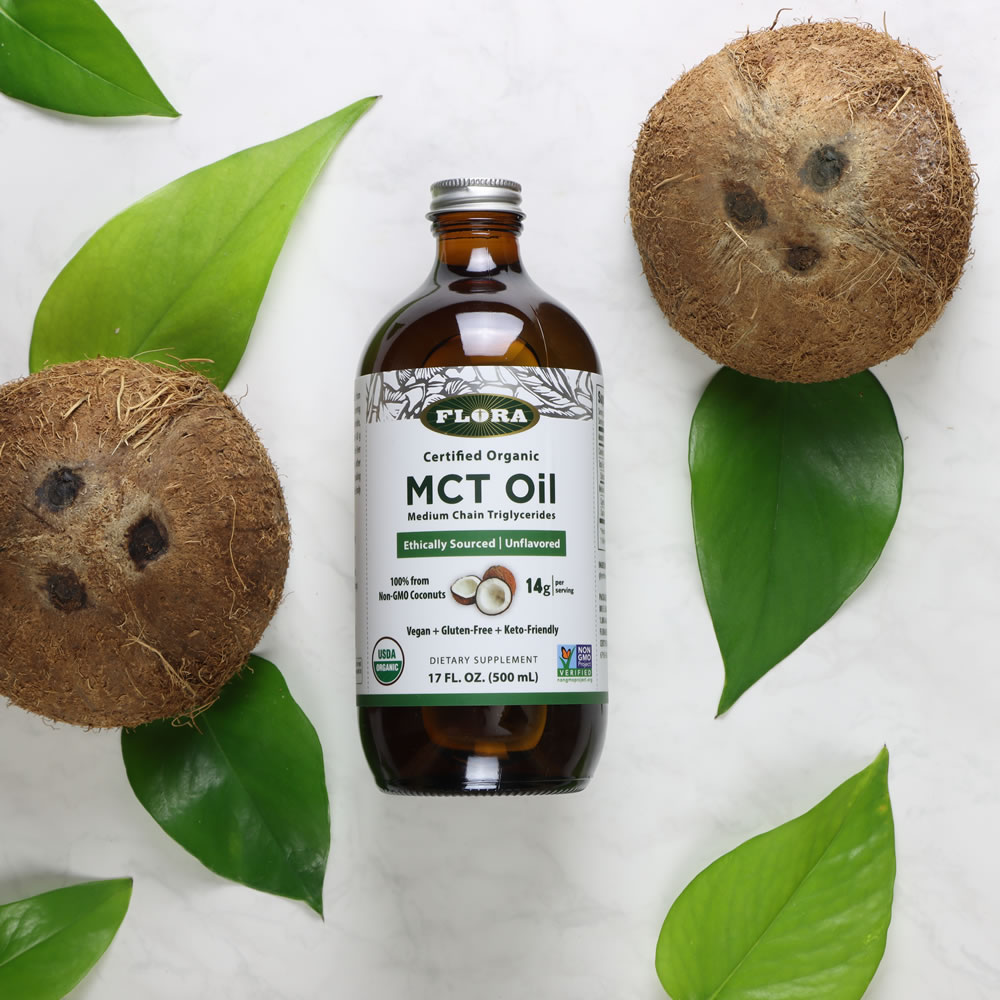
What to Look for in a High-Quality MCT Oil
The main thing to look for in a high-quality MCT oil is that it’s made purely from coconuts, as palm oil, another source of MCTs, has been associated with deforestation, threatening wildlife diversity and poor conditions and treatment of workers.
Also be sure to be on the lookout for any additional ingredients, flavorings, or fillers (like unhealthy oils) that may alter the MCT oil’s benefits.
The process by which MCT oil is made is important too. MCT oil is produced by a process called fractionation. To achieve this some companies use industrial chemical solvents like hexane, which have been linked to cases of nerve damage.
For a super high-quality MCT oil that’s hexane free, solvent free and filler free Flora Health Organic MCT Oil is a super choice.
Made of beneficial C8 and C10 MCTs, each 1 tablespoon serving of Flora Health Organic MCT Oil provides:
- 14 g total of medium-chain triglycerides
- 7.5 g of caprylic acid
- 4.8 g of capric acid
Made from sustainably sourced coconuts, Flora Health Organic MCT Oil is also:
- Certified organic
- Produced using cold fractionation which requires no chemicals
- Keto-friendly
- Vegan + Gluten-free
- Non-GMO
Flora Health MCT Oil May Help You If:
You’re Getting Started on a Keto Diet
MCT Oil can help increase ketone production, boost energy and help you shift to a fat burning state of ketosis. For some it also helps with dips in energy or symptoms some feel while getting into ketosis, known as “keto flu.”
You’re Already On Keto
Adding MCT Oil to your routine can give you a quick source of energy to help you stay in ketosis, boost ketone production, boost energy and focus while helping you feel fuller between meals so you can stay a fat burning machine.
You’re Not Doing Keto, but Still Want The Benefits
Even if you’re not on a keto diet, adding MCT Oil to your diet may help you feel fuller while reducing cravings between meals, which can help you eat less throughout the day. It can also help boost your energy before workouts and help provide your brain with a boost of energy before doing work that needs focus.
➡ Want the Benefits of MCT Oil? Visit Flora Health to buy sustainable and organic C8-C10 MCT Oil
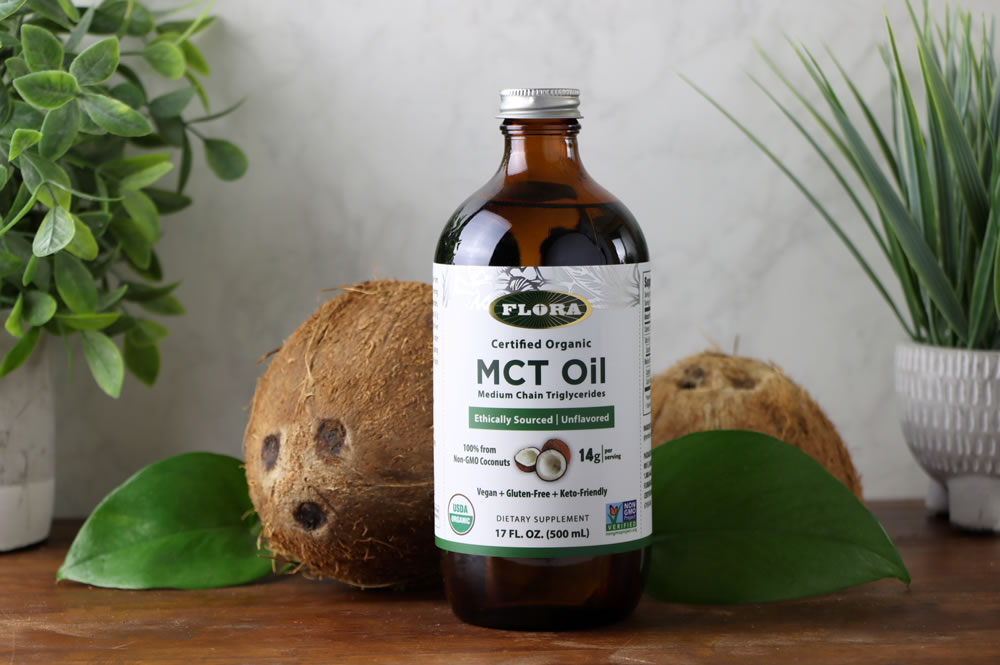
Better Living uses affiliate links. If you make a purchase through them, we may receive a small commission (for which we are deeply grateful) at no cost to you.

